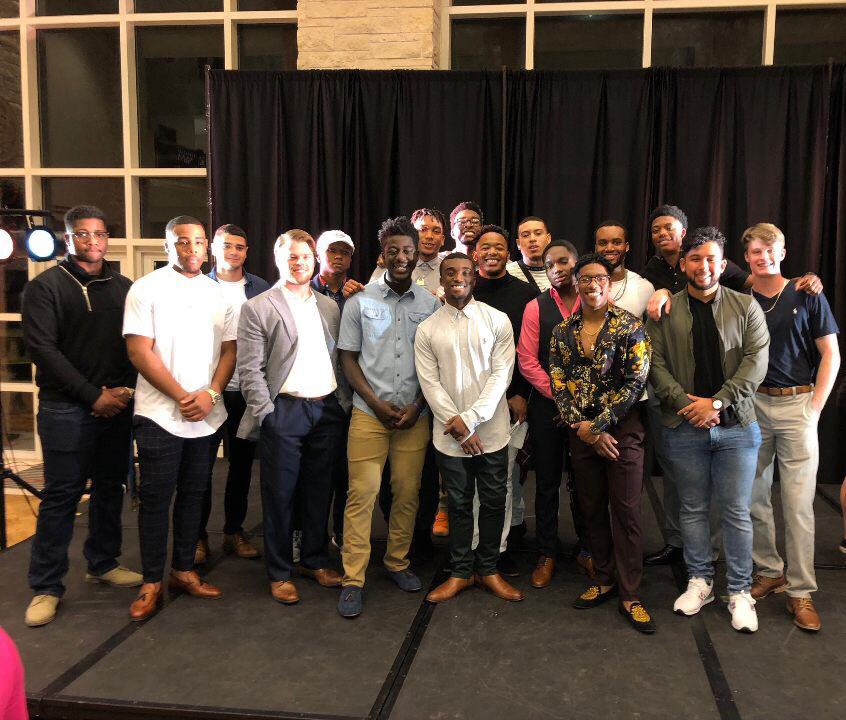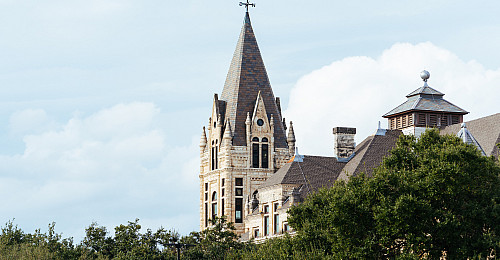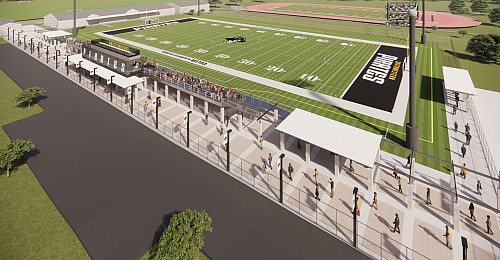Athletics
Student–Athletes Find Their Voices through EMPIRE
Open gallery

A week after the video circulated of a Minneapolis police officer killing George Floyd while three other officers passively watched, Markell Henderson finally broke down.
“I’m not really one to cry, but I was having a discussion with someone, and I couldn’t articulate my feelings,” Henderson, a class of 2019 Southwestern University football alumnus, said. “I just lost it. I was sad, frustrated, and angry. What they did was wrong, and something had to change.”
Tired, Henderson turned his phone off for the night. Undeterred, he awoke the next morning resolved to take action.
Henderson spent the week contemplating going to the protests. At Southwestern, Henderson was a leader on campus and in the locker room. Now, he was in a new setting in Chicago in the midst of a global pandemic.
Ultimately, he decided, leaders lead.
“How can I say we need change if I’m not willing to go and use my voice to be part of the movement?” Henderson said. “How can I, as a Black man, say we need change if I’m not willing to do my part?”
These weren’t the first protests Henderson witnessed. Every student and recent graduate of Southwestern over the past few years has grown up in an era of social media capturing police brutality and protests dating back to Ferguson, Missouri, in 2014. This protest, however, was different.
“It was very uplifting to not only see how many people were there but also who was there,” Henderson said. “There were men, women, and children of all races, ethnicities, and backgrounds, and they were all there in support.”
For three weeks, our nation has seen sustained protests that have already spurred action toward reimagining systems that have historically oppressed Black people.
The key to this push has been a broad coalition of people from all walks of life working together to amplify diverse voices.
Nearly five years ago, Henderson helped plant the seeds of such a diverse coalition here at Southwestern University.
“In the fall of 2015, three young African-American men [Henderson and twins Jermaine Dumes and Jahmall Dumes] approached me about being the advisor for an organization they had conceptualized,” Associate Professor of Education Alicia Moore said. “I told the young men that I would be ecstatic to be their advisor; my only caveats were that they had to operate as a service organization and that I had to be hands-on in supporting their success.”
From that conversation, an EMPIRE—or the Established Men Promoting Intelligence, Respect, and Efficacy—was born.
Most of the original nine founding members were members of the newly reincarnated football program. Athletics added more diversity to Southwestern University but not always a sense of belonging.
“We started EMPIRE because we had a few encounters with people on campus and in the community who thought the only reason we were there was to play sports,” Henderson said. “We wanted to show we’re more than athletes.”
“In my 19 years as a professor at Southwestern University, there have been ebbs and flows related to race relations,” Moore said. “The young men who joined EMPIRE were aware that their acceptance, though seemingly positive within athletics, was not always that way for other African-American males. The members knew that, as campus leaders, it was partly their responsibility to begin this process with the support of myself and student-activities personnel as advocates. At the time, the campus was open to it. We know a lot of that had to do with football, but it was a start.”
Sports have often been an arena through which people have broken through barriers. But too often, the value of an athlete is limited to the confines of those arenas.
“I don’t understand why people get mad when an athlete brings protests into sports,” Mason Biggers, the current president of EMPIRE and member of the football team, said. “They say, ‘This isn’t the place or time.’ But this is our life. We live it every day. Who is anyone to say how [athletes] use their platform?”
Racism in America isn’t always the use of racist slurs or affiliation with verified white-supremacy groups. Often, racism can be seen in the voices organizations choose to value and those they choose to ignore.
An example is how organizations like local news, lacking diversity in decision-making decisions, can sometimes frame a narrative with or without intent.
Trenton Garrett, the current vice president of EMPIRE and the only senior on the basketball team this upcoming season, notes how social media has changed things by contrasting news broadcasts with social media, where everyone has a voice.
“You see footage of the protests on the news, and it shows police kneeling and marching alongside the protestors,” Garrett explained. “But if you look at social media, people at the protests are videoing [those] same police [departments] doing drive-by shootings with rubber bullets and pepper spray as protestors are running away. So social media is showing what’s going on behind the scenes that the media isn’t always showing.”
EMPIRE was created to help provide that voice on campus and create leaders in the community. According to its constitution, EMPIRE’s purpose is to “provide a positive social and political context that will influence the success of African-American males on the Southwestern University campus.”
Part of that is giving people of color on campus a place to be comfortable at a predominantly white school. But it’s also an inclusive organization that seeks to bridge gaps of knowledge and culture.
“Seeking community with professors and other students, finding the people that you can go to and share thoughts with—that’s how ideas, organizations, and initiatives are born,” Henderson said. “Seeking out that community and sharing ideas is really big.”
One of the early events EMPIRE put together was a panel on policing in communities of color, bringing in law-enforcement officers to have a dialogue.
“It’s something we’re still talking about and trying to develop initiatives to improve the way police engage with Black and Brown people in this country,” Henderson said.
Garrett believes part of the problem is people assume their own life experiences are universal.
“A lot of people think police brutality doesn’t exist because the way they were raised,” Garrett said. “If they saw a police officer, it was a ‘hey, how are you doing?’ Or, if you did something wrong, you actually did something wrong. So they go out into a society where they don’t realize what’s going on because of their privilege.”
“First and foremost, research tells us that the work of paving the way for diversity and racial healing has fallen squarely in the laps of Black people (and other people of color),” Moore said. “EMPIRE has, in the past, hosted programs for the campus that examine racism and educate our community about societal injustices. But they can’t do it themselves. Advocates must be a part of the movement forward. Black students are tired of having to lead the charge to change. Change is a shared vision that leads to a shared understanding and shared actions.”
Over the past few years, EMPIRE has emerged from the perception of being only for Black people, growing to a roughly 60/40 split of Black and non-Black students. EMPIRE doesn’t strive to move past differences but to celebrate them.
“It’s harmful when people say they don’t see color. I understand where they’re coming from, but that’s not the point,” Biggers said. “Seeing people’s differences and understanding that makes them unique but doesn’t make anyone above or below you is a better perspective. Everyone’s color and culture makes them who they are. When you don’t see that, it takes that away from them.”
Superficial diversity isn’t helpful either.
“I think it’s important to do it in a sincere way,” Biggers said. “[Institutions] will take your picture and say they have diversity in ads but not always promote those voices on campus.”
Black issues are economic issues, education issues, hiring issues, and every other issue, which is why it is important for student organizations like EMPIRE to have a voice in matters far beyond diversity and race.
“Our voice is important because it brings changes and different ideas on campus,” Garrett said. “The goal is to have inclusion and diversity, but if you don’t give us a voice, you’re not going to see those results.”
But it’s important for EMPIRE to not do it alone. Through its community service around Georgetown, its collaboration with other student organizations on service-based projects, and events like its annual crawfish boil, EMPIRE has worked to build several bridges.
“At the end of the day, we all have to hold each other accountable,” Henderson said.
“Acknowledge what’s going on and acknowledge Black lives matter,” Garrett said. “If you believe in that, do it with your heart. Do it because you understand what’s going on. And if you don’t understand, educate yourself.”
When EMPIRE and the rest of the Southwestern community return to campus, the world should look drastically different from when the campus closed.
“I really hope people aren’t walking on eggshells,” Biggers said. “I feel like a lot of barriers have been broken to where we can have these uncomfortable but necessary conversations.”
“At the end of the day, you have to call things out,” Henderson said. “We pride ourselves on being a community, but in order to be close, you have to be open and transparent and call out things that are racist. Sometimes, it might genuinely be a lack of knowledge. Maybe someone doesn’t understand why responding to Black Lives Matter with All Lives Matter is wrong.”
The key, Henderson said, is to do it with love and to do it together.
“You have to be able to say, ‘I care about you and I think a lot of you, so this is why what you said is wrong,’” Henderson said. “People at Southwestern and other schools, they’re going to go out and own businesses and be community leaders, and they might not be aware of their biases or how systems oppress people in this country. So you have to call it out and let people know it’s coming from a place of love.”
Two weeks ago, Henderson had trouble finding the words to describe the pain of witnessing the death of Floyd. Through years of helping to build EMPIRE, however, he’s found a way to amplify his voice and the voice of many others at Southwestern University.
Read more Southwestern Pirate stories at www.southwesternpirates.com.















